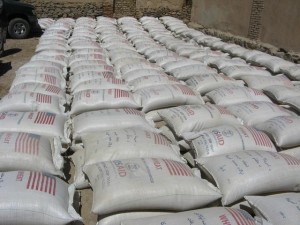
World Bank | January 2009 | excerpt
Is land acquisition a viable strategy?
Arab investors are increasingly buying or leasing land in poor but land-abundant countries to secure their food supply. This strategy is often described as a win-win. The investor country acquires land and guaranteed access to the food produced on it, while reaping high financial returns to its investment. At the same time, the recipient country gets an infusion of capital into its agricultural sector, leading to economic development. For this to truly be a win-win arrangement, however, it is imperative that the investor country protect the recipient country’s citizens from nationalization or expropriation, labor abuses, and loss of their own food security.
Saudi Arabia and the UAE are worldwide leaders in buying land in third-party countries. These two oil-rich Arab countries hold more than 2.8 million hectares between the two of them, mostly in Indonesia, Pakistan, and Sudan. Several other countries have also either acquired or attempted to acquire foreign agricultural land: Egypt in Uganda and Sudan; Bahrain in the Philippines; Kuwait in Cambodia, Laos, and Myanmar; Libya in Ukraine and Zimbabwe; and Qatar in Cambodia (The Economist, 2008; Sudan Tribune, 2009). The other major investors in foreign land are China and Japan. Investment is done by governments (UAE), multinational financial institutions (Arab Authority for Agricultural Investment and Development, or AAAID), and private companies (Saudi Arabia’s Al-Qudra). Public-private partnerships have been suggested in which the public sector absorbs risk and the private sector maximizes profit (Dubai School of Government, 2008). However, such a strategy might encourage reckless investing by the private sector if it does not internalize risk
Investors should carefully separate development goals from their food security goals. Investors seek to match their abundant capital with host countries’ abundant land and labor. From a development perspective, this makes perfect sense both for the investor and the host country. However, high returns inherently involve high risk, which is a major drawback when the goal is food security. Large-scale farming operations have a notable history of failure in Sudan, and despite its agricultural potential the World Food Program currently feeds 5.6 million people there. Sudan cannot manage to produce enough food for its own population, let alone those of investor countries. In a country whose people are hungry, an attempt to take the harvest away from farmers and deliver it to a wealthier investor country could be met with grave political repercussions. Recently, Daewoo Logistics of South Korea’s 99 year lease of 1.3 million hectares of agricultural land in Madagascar (over half of Madagascar’s agricultural land) fell through because of political backlash
in the host country over what was perceived as “neo-colonialism” (Ryall and Plfanz, 2009). Although such resistance may not arise in other host countries, it should serve as a warning of the potential political difficulties associated with acquiring agricultural land in other countries to achieve greater food security. Bureaucratic slow downs in host countries also form a deterrent to this investment strategy; exporting a container of food requires 24 days from Pakistan, 35 days from the Sudan, and 89 days from Kazakhstan (Dubai School of Government, 2008). If food security goals and development goals are both to be met with investment in foreign land, it is essential that the political environment and the business environment are conducive to the certain and timely delivery of production. Establishing farming operations in third-party countries may allow investors to shield themselves from market risk, but at a cost. Using the global market to secure large quantities of food can be fraught with uncertainty, as the recent food-price shocks proved. However, opting to invest in third-party countries instead of using the market requires the investor to take on all of the weather risk of the host country, rather than choose which country to secure food from. Idiosyncratic political risk in the host country may also be a major concern, especially in countries like Sudan which have experienced frequent conflict. The market allows for more flexibility than third-party investment. Capital locked up in land purchases and long-term leases cannot easily be freed up to buy food from other suppliers when there is bad weather or political disruptions in the host country. Full report available here: http://siteresources.worldbank.org/INTMENA/Resources/FoodSecfinal.pdf











